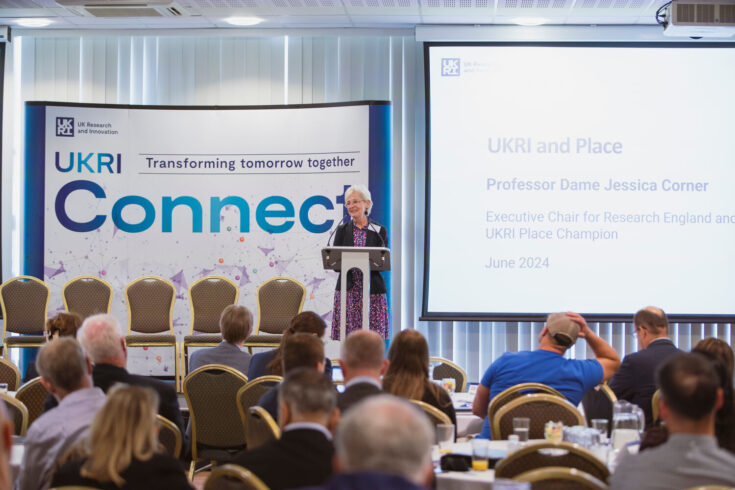Since my appointment, it has been my pleasure to be UK Research and Innovation’s (UKRI) Executive Champion for Place and in this role, I have met people from all nations and regions of the UK. I have seen first-hand the passion and enthusiasm that people have for both their locality and the contribution that they can make to our collective research and innovation endeavour.
As we look ahead to policies shaped by the new government, focused on its five missions and in particular a strong priority to deliver economic growth in all parts of the UK, we are developing plans across UKRI on ways that we can work with places to deliver our goal to build a thriving, inclusive research and innovation system that connects discovery to prosperity and public good, delivering benefits that are shared widely.
Our strategic approach to places, set out in our world-class places strategic objective within the UKRI strategy 2022 to 2027: transforming tomorrow together, can be summarised as:
- enhancing connections across research and innovation
- strengthening research and innovation clusters across the UK
- delivering economic, social and cultural benefits to all citizens
Connecting partners in the research and innovation system
In my role as Executive Chair and UKRI Place Champion I meet regularly with a wide variety of stakeholders. And the number and range of people that we engage with across our organisation is vast – hundreds of research organisations, universities, researchers and teams, and thousands of businesses, as well as devolved and local government.
While there are many outstanding collaborations, there is immense potential for UKRI and places to be better connected. This means both better sharing of insights within UKRI and better connections within and between places across the UK; it is only by leveraging the entire ecosystem that we will deliver the transformational outcomes we seek.
Investing in clusters across the UK for widest impact
Indeed, interconnections are one of the defining features of research and innovation clusters. In practice, clusters can be defined around population centres, research infrastructure or more flexibly to reflect the geographies of specific business sectors and technologies. Investing in clusters of expertise has consistently been shown to help boost local and regional innovation and productivity, which in turn can have a reinforcing effect in terms of attracting talent and private sector investment.
The flip side of clusters is that activity and investment is focused in locations, which means that every location will not see the same level of investment. For several years now, UKRI has published data on geographical distribution of funding, which helps inform our own approach as well as enabling transparency. I have heard many strongly held views on the efficacy of a target for spend outside the Greater South East, however my view is that it is hard to argue with the ambition of creating more research and innovation strengths that are better distributed across the UK.
Benefitting all citizens
Insights and investment are both important, but the ultimate goal is to make a difference to people’s lives. There are many fantastic examples of UKRI’s benefits reaching across geographies; with my own background in nursing, I was particularly struck by the work of the iiCON project on the Liverpool Vaccine Equity programme. This increased vaccine uptake in hard-to-reach population groups in the city and is one example of how the benefits of research and innovation are reaching more citizens.
Beyond the benefits that we can have through our programmes and investments, there is a broader goal for us to bring research and innovation closer to more people in more areas. While we cannot create research and innovation clusters everywhere, we can aim for our investments to support opportunities in more places.
An investment strategy for places
The next Spending Review will be the first for UKRI that has included formal commitments around place, so we will be preparing an investment strategy for places, which will set out at a high-level how UKRI investment will be informed by opportunities in places across the UK.
The strategy will build on the lessons learnt from existing programmes as well as wider evidence, including our report on evidence of what works: research and innovation and place.
For example, we will be considering the possibilities for working with funders and stakeholders to:
- form partnerships to maximise growth and impact
- enable collaborations to build on strengths in places
- anchor value through complementary investments
- seed new research and innovation capabilities over the long-term
We are working up a range of options that will take into account the learning from UKRI’s current place programmes, complementarity with our existing portfolio and, of course, the Spending Review outcome.
To inform our work, we are interested in collecting perspectives on the current landscape and to that end, I would appreciate input to the following short response form ideally by 13 September 2024.
Complete the Citizens Space survey: how can we shape investments in places to maximise national, regional and local impact?




